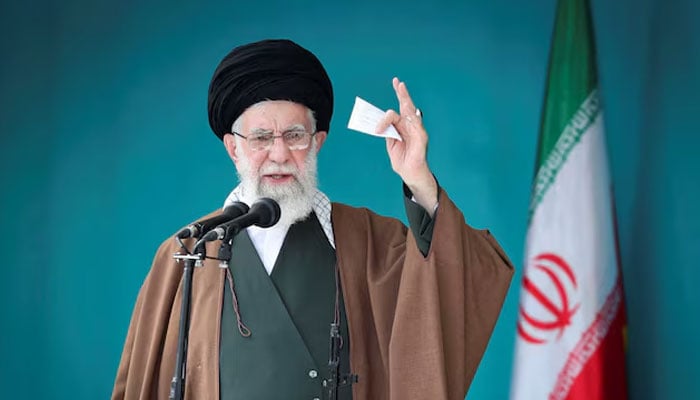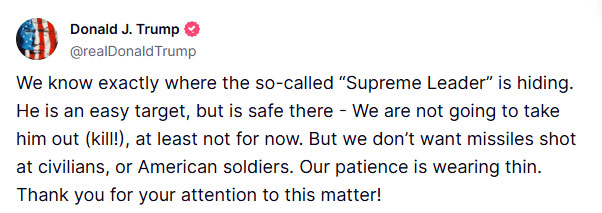
Iran’s Supreme Leader Ayatollah Ali Khamenei on Wednesday rejected US President Donald Trump’s demand for Tehran’s ‘unconditional surrender’.
In a recorded speech played on television, his first appearance since Friday, Khamenei, said the Americans “should know that any US military intervention will undoubtedly be accompanied by irreparable damage.”
“Intelligent people who know Iran, the Iranian nation and its history will never speak to this nation in threatening language because the Iranian nation will not surrender,” he said.
Trump has veered from proposing a swift diplomatic end to the war to suggesting the United States might join it. In social media posts on Tuesday he mused about killing Khamenei, then demanded Iran’s “UNCONDITIONAL SURRENDER!”
A source familiar with internal discussions said Trump and his team were considering options which included joining Israel in strikes against Iranian nuclear sites.
Israel’s military said 50 Israeli jets had struck around 20 targets in Tehran overnight, including sites producing raw materials, components and manufacturing systems for missiles. The military told Iranians to leave parts of the capital for their safety while it struck targets.
Russia’s foreign ministry said the world was “millimetres away from catastrophe” due to daily strikes on Iran’s nuclear sites. Germany’s foreign minister appealed to Iran’s leaders to make credible assurances they were not seeking a nuclear weapon and show willingness to find a negotiated solution.
Raising stakes
The prospect that Trump could bring the United States into the war has raised the stakes since he abandoned a summit of the Group of Seven industrialised countries and met his security officials in Washington on Tuesday.
Iran had conveyed to Washington that it would retaliate strongly without restraint against the United States for any direct participation, its ambassador to the United Nations in Geneva, Ali Bahreini, said. He said he already saw the US as “complicit in what Israel is doing”.
Iranian officials have reported at least 224 deaths in Israeli attacks, mostly civilians.
In Israel, Iran’s retaliatory strikes are the first time in decades of shadow war and proxy conflict that a significant number of missiles fired from Iran have penetrated defences.
Explosions were heard over Tel Aviv on Wednesday. The military said two barrages of Iranian missiles were launched toward Israel in the first two hours of Wednesday morning.
Iranian news websites said Israel was attacking a university linked to Iran’s Revolutionary Guards in the country’s east, and the Khojir ballistic missile facility near Tehran, which was also targeted by Israeli airstrikes last October.








